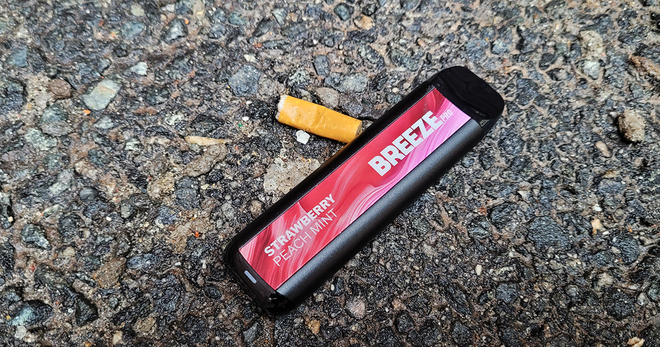Most young users put disposable e-cigarettes in trash, creating huge streams of toxic and hazardous waste, as companies fail to take responsibility
Disposable e-cigarettes – now the most popular type of e-cigarettes among young people – are not only attracting young people to nicotine use with candy, dessert, and fruit flavors. The single-use plastic devices, which contain lithium batteries and heavy metals, are also creating large streams of toxic and hazardous waste.
A new Truth Initiative survey of 15-24-year-olds finds that two-thirds (68%) of disposable e-cigarette users threw their empty disposable e-cigarettes in the trash, 13% dropped them in regular recycling bins, 9% littered them on the ground, and 8% sent them to electronic recycling facilities. With 19% of current vapers tossing five or more vapes in the trash every month, empty disposable e-cigarettes are piling up and contributing to a growing global e-waste problem.
Truth Initiative first highlighted the environmental dangers of e-cigarettes in the 2021 report “A toxic, plastic problem: E-cigarette waste and the environment,” which found that more than half (51%) of young e-cigarette users threw used e-cigarette pods or empty disposables in the trash. Now, new data reveal the situation has gotten worse as the popularity of disposables has grown. Meanwhile, safe disposal guidance for vapes and their components is virtually non-existent from manufacturers.

The rise of disposable e-cigarettes
How To Dispose Of Puff Bar
With flavors like cheesecake, bubble gum, and strawberry ice cream, disposable e-cigarettes like Puff Bar and Elf Bar saw a huge rise in popularity after they were exempted from a Food and Drug Administration policy in 2020 that only removed flavored pod-based e-cigarettes like JUUL from the market. As a result, use of disposable e-cigarettes increased over 1,000% between 2019 and 2020 among high school e-cigarette users.
These products, which are on the market illegally because they have not undergone the required FDA review process, have yet to face significant regulation. In 2022, disposable e-cigarette use became more popular than ever, with disposables making up nearly 50% of the U.S. e-cigarette market share
Companies fail to provide safe disposal guidance
environmentally friendly way to dispose of disposable vapes like the Elf Bar
E-cigarette products are evolving so quickly that guidance and information on disposing e-cigarette waste responsibly struggles to keep up. At the same time, e-cigarette companies fail to inform consumers how to dispose of products safely and in an environmentally conscious manner. Environmentally conscious users run into roadblocks if they try to dispose of their single-use vapes responsibly.
- E-cigarette companies do not provide clear instructions to users on how to dispose of e-cigarettes. Vuse advises consumers not to dispose of its power unit with trash and to contact local waste management officials for more information on how to dispose of batteries, while Puff Bar, the most popular disposable e-cigarette brand, offers no guidance on its website at all.
- Recycling programs for disposable e-cigarettes in the U.S. do not exist. Safe disposal guidance for vapes and their components is virtually non-existent. Waste management and recycling facilities are not equipped to handle toxic and electronic e-cigarette waste – especially in difficult to separate disposable devices.
- Federal guidance on e-cigarette disposal is limited and geared towards rechargeable devices with removable components. FDA advises users not to throw e-cigarette devices, e-liquid waste, or pods into the trash, and says that e-cigarette waste should be taken to hazardous waste facilities, and removed batteries sent to certified battery electronic recyclers. This guidance doesn’t work for disposable devices: removing e-liquid waste and lithium batteries from disposable devices is dangerous, since punctured batteries can easily start a chemical fire and e-liquids could contaminate the environment.
Dangers of disposable e-cigarette waste
How do vapes effect the environment
Like cigarettes, littered e-cigarettes are a major source of environmental pollution, which we detailed in our fact sheet “Tobacco and the Environment.” Disposable e-cigarettes specifically contain multiple types of waste: hazardous waste from residual nicotine, heavy metals from the vaporizer’s electrical circuitry, lithium batteries, residual e-liquid, and plastic waste from a non-decomposable outer shell and packaging materials. When littered, this toxic chemical and plastic vape waste degrades and leaches into the environment, contaminating ecosystems and wildlife. Disposable vape e-waste can be ingested by animals and present a choking risk for children.
Disposable vapes are also a fire hazard especially when thrown in the trash or regular recycling bins. The lithium batteries can explode or start fires in recycling bins, waste trucks, or waste processing plants if accidentally turned on or crushed in trash compacters. Almost 200 e-cigarette explosions and fires leading to 133 acute injuries were documented between 2009-2016, according to a 2017 report from the U.S. Fire Administration.
Urgent need for guidance and accountability on how to safely throw away disposable e-cigarettes
How to recycle disposable vapes like the Elf Bar
Record levels of disposable e-cigarette use coupled with the lack of clear disposal guidance from e-cigarette makers alongside recycling facilities ill-equipped to handle e-cigarette waste set the stage for significant environmental consequences. Most disposable e-cigarettes are on the market illegally, and the environmental issue is just one more reason for FDA to act quickly in its review and enforcement of all e-cigarette products. In the meantime, we need accountability for safe and environmentally friendly disposal of these products.
To mitigate future harm and stem the ongoing environmental impact of e-cigarette waste, public health leaders, federal regulators, and the tobacco industry must take urgently needed action, including:
- Develop federal regulatory guidance. The FDA or EPA should require e-cigarette manufacturers to develop standard e-cigarette waste management processes and clean-up programs that are safe and environmentally conscious and enact penalties for industry non-compliance.
- Prohibit the sale of single-use e-cigarettes at local and state levels. Some localities already have done so, including Monterey, Monterey County, and San Benito County in California.
- Hold e-cigarette manufacturers fiscally and legally responsible for e-cigarette waste. Manufacturers that fail to provide consumers with clear disposal guidelines and fail to educate consumers on the environmental consequences of non-biodegradable products should face financial and legal consequences.
- Educate e-cigarette users about the environmental impact of littering e-cigarettes. Some e-cigarette users are tossing disposable e-cigarettes into regular recycling, suggesting that they believe their vapes are being recycled, potentially leading them to underestimate the environmental impact of their products.
- Encourage e-cigarette users to quit. This is Quitting – the first-of-its-kind program from Truth Initiative to help young people quit vaping – has helped over 500,000 youth and young adults on their journey to quit vaping. Teens and young adults can join for free by texting DITCHVAPE to 88709.
Read more about the environmental impacts of vaping in “A toxic, plastic problem: E-cigarette waste and the environment.”
More in harmful effects of tobacco
Want support quitting? Join EX Program
By clicking JOIN, you agree to the Terms, Text Message Terms and Privacy Policy.
Msg&Data rates may apply; msgs are automated.


